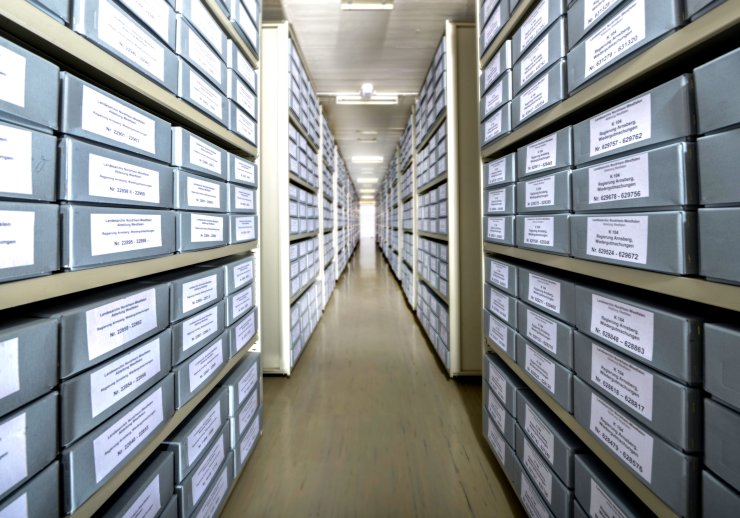Archive expertise
The work areas of an archive include various fields. The content of the archive records is at the centre of the archiving and indexing process. Which files are transferred and how can their content be researched?
Preservation deals with the materiality of the documents. How can documents from the Middle Ages or film material be safely stored for eternity?
Digital archiving has long been another focus of the archive's work. In addition to digitised paper files, for example, the servers of the Landesarchiv Nordrhein-Westfalen are growing with more and more hybrid or genuinely electronic files.
Tradition formation
‘The authorities, courts and other bodies of the state must offer to the Landesarchiv all documents that they no longer need to fulfil their tasks.’
(§ 4 Archive Act of North Rhine-Westphalia).
The archivists at the Landesarchiv Nordrhein-Westfalen currently look after over 1,300 departments that are obliged to hand over their records. The North Rhine-Westphalian justice administration alone produces around 48 kilometres of documents every year. In addition to documents from state agencies, the Landesarchiv also accepts non-official archive material of public interest.
Archiving models
According to a resolution passed by the state government in spring 2002, the maximum annual transfer volume of the Landesarchiv Nordrhein-Westfalen is limited to 2.2 kilometres. Archiving models are an important working tool in order to be able to fulfil the legal task of archiving within this framework. The models are used to identify the parts of the written material that are worthy of archiving and to create a meaningful record. This makes archival work more transparent, more effective and easier to plan. In recent years, the Landesarchiv has already created models for the following administrative areas for the major document producers in the state administration: Police (2006), Financial Administration (2006), Justice (2008), Personnel Administration (2009), Schools and Further Education (2013), Nature, Environment and Consumers (2018) and Urban Development and Housing (2025). The Landesarchiv will extend its work on archiving models to other administrative areas in the coming years.
Cataloguing
The Landesarchiv Nordrhein-Westfalen uses the VERA cataloguing software. All information is recorded electronically in a database. This means that the data can be searched in a variety of ways and can be entered into archive portals such as www.archive.nrw.de or www.archivportal-d.de.
The cataloguing data is also available on the following websites:
monasterium.net
Conservation
The preservation of original archive material is one of the central statutory tasks of the Landesarchiv Nordrhein-Westfalen. In order to fulfil this task, there is a central restoration workshop in Münster-Coerde, which realises larger in-house projects. In addition, smaller restoration teams are deployed in the regional divisions.
Digitisation
The digitisation of archival records enables users of the Landesarchiv Nordrhein-Westfalen to access the documents they are looking for from any location and to evaluate and use them in a variety of ways. In addition, the originals are protected by no longer having to be physically presented in the reading room. The digitisation of archival records is carried out at the Landesarchiv's Technical Centre and by service providers. Central holdings of the divisions, archival records that are very frequently requested (such as civil status records) and archival records that are severely damaged and for which restoration would be disproportionate are digitised. In addition to analogue files, maps and plans, films, photos and audio files are also digitised so that they can be preserved and used in the long term in the face of rapid technological change.
Some of the digitized material has already been posted on various portals. You can find out which ones these are under the heading “ Cataloguing.”
Electronic archiving
The Landesarchiv Nordrhein-Westfalen also archives electronic files, databases, registers, photos, films, websites and other digital objects that are significant for the history of the state. For digital archiving, the Landesarchiv operates a high-performance technical infrastructure at a central location, to which several redundant archive storage facilities at different locations are connected - this means that data loss can be largely ruled out, even in the event of a disaster.
Transfer work
The final theses in the training programme for the higher archive service on issues of practical relevance often contain valuable information for practical work in the archives. As these do not usually appear in printed form, they are published online here.
Projects
One of the strategic goals of the Landesarchiv Nordrhein-Westfalen is to work with external partners to carry out externally funded projects. We also co-operate with universities or other institutions or associations to make archive material accessible.
- Copy URL
- Facebook share
- X
